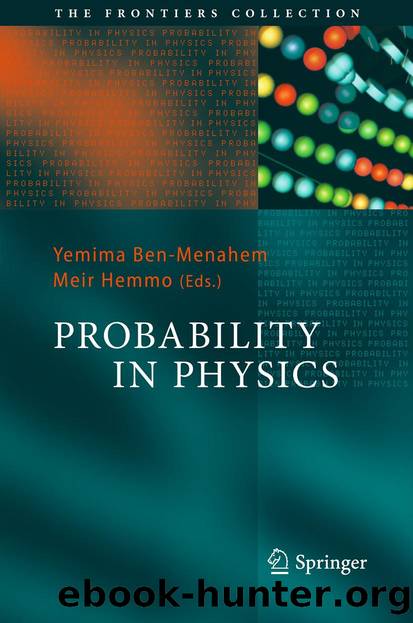Probability in Physics by Yemima Ben-Menahem & Meir Hemmo

Author:Yemima Ben-Menahem & Meir Hemmo
Language: eng
Format: epub
Publisher: Springer Berlin Heidelberg, Berlin, Heidelberg
nonlocality and determinism
locality and indeterminism
nonlocality and indeterminism
Note, however, that the fourth combination, nonlocality and indeterminism, although logically possible, poses a serious epistemological difficulty. Nonlocality, i.e., an instantaneous interaction between distant events, or a transmission of signals between them that exceeds the speed limit, can only be demonstrated via the existence of recurring correlations between such distant events. Individual nonlocal interactions would not be identified by us as interactions, but seen, instead, as the occurrence of independent and causally unrelated events. But recurring correlations, even merely probabilistic ones, introduce at least some degree of regularity, or determinism, into the picture. A local indeterministic influence could perhaps still be identified as such when the actual trajectory of the action is visible: For example, if we witnessed that identical pushes of a ball result in its moving haphazardly in different directions, we could perhaps still think of the push as a cause, albeit one that does not act deterministically. By contrast, a nonlocal indeterministic interaction could not be perceived in this way. Hence, the fourth possibility, combining nonlocality and indeterminism, can only appear in our theories in a tempered form; such theories will not be totally indeterministic with regard to all parameters. Surprisingly, then, a grain of determinism turns out to be de facto, even if not de jure, necessary for nonlocality; necessary, that is, for the formulation of a nonlocal theory.9 In our actual theories, therefore, we do not have absolute independence between determinism and locality after all.
The history of physics provides concrete examples of possible combinations of locality and determinism. While the special theory of relativity (STR) is local and deterministic, exemplifying the first possibility above, Newtonian mechanics, which is nonlocal and deterministic, exemplifies the second.10 Determinism is evidently not a sufficient condition for locality. But is it a necessary condition? Or, putting the same question counterpositively, is indeterminism sufficient for nonlocality? Here again, from the purely conceptual point of view, the answer seems to be negative. Nonetheless, in actual theories, OM in particular, we get a more complicated picture. Let me briefly review the situation.
Famously, the threat to locality appears in the context of QM with the phenomenon of quantum entanglementâthe existence of states exhibiting long-distance correlations that are maintained even when the systems occupying these states are separated by spacelike intervals. Entanglement was identified by Schrödinger in 1935 and is amply demonstrated by experiment. It is a well-known fact that correlations challenge our causal intuitions more than singular events. While most people can envisage random singular events, systematic correlations seem to demand a causal explanation. Systematic correlations are thus generally explained either as the result of direct causal influences or as the result of âcommon causesâ acting on the systems in question at an earlier time and producing the correlated states.11 Such common causes are said to âscreen offâ the dependence between correlated states, meaning that, conditional on the common cause, the states no longer appear inter-dependent.12 If the explanatory options of direct influence and common causes are exhaustive,
Download
This site does not store any files on its server. We only index and link to content provided by other sites. Please contact the content providers to delete copyright contents if any and email us, we'll remove relevant links or contents immediately.
Weapons of Math Destruction by Cathy O'Neil(5056)
Factfulness: Ten Reasons We're Wrong About the World – and Why Things Are Better Than You Think by Hans Rosling(4034)
Factfulness_Ten Reasons We're Wrong About the World_and Why Things Are Better Than You Think by Hans Rosling(2761)
Descartes' Error by Antonio Damasio(2748)
A Mind For Numbers: How to Excel at Math and Science (Even If You Flunked Algebra) by Barbara Oakley(2698)
TCP IP by Todd Lammle(2649)
Applied Predictive Modeling by Max Kuhn & Kjell Johnson(2493)
Fooled by Randomness: The Hidden Role of Chance in Life and in the Markets by Nassim Nicholas Taleb(2424)
The Book of Numbers by Peter Bentley(2416)
The Tyranny of Metrics by Jerry Z. Muller(2412)
The Great Unknown by Marcus du Sautoy(2196)
Once Upon an Algorithm by Martin Erwig(2154)
Easy Algebra Step-by-Step by Sandra Luna McCune(2129)
Practical Guide To Principal Component Methods in R (Multivariate Analysis Book 2) by Alboukadel Kassambara(2100)
Lady Luck by Kristen Ashley(2082)
Police Exams Prep 2018-2019 by Kaplan Test Prep(2041)
Linear Time-Invariant Systems, Behaviors and Modules by Ulrich Oberst & Martin Scheicher & Ingrid Scheicher(1987)
All Things Reconsidered by Bill Thompson III(1965)
Secrets of Creation, Volume 1: The Mystery of the Prime Numbers by Watkins Matthew(1875)
